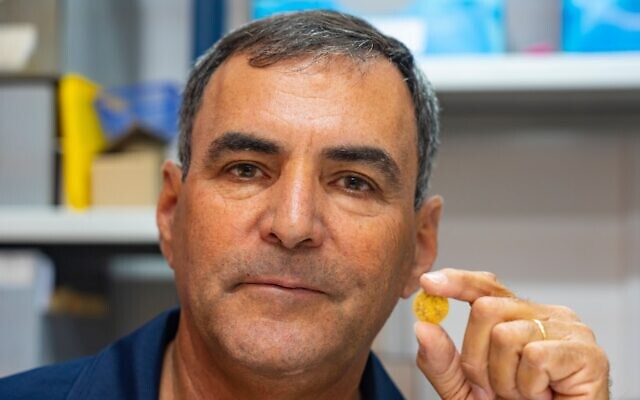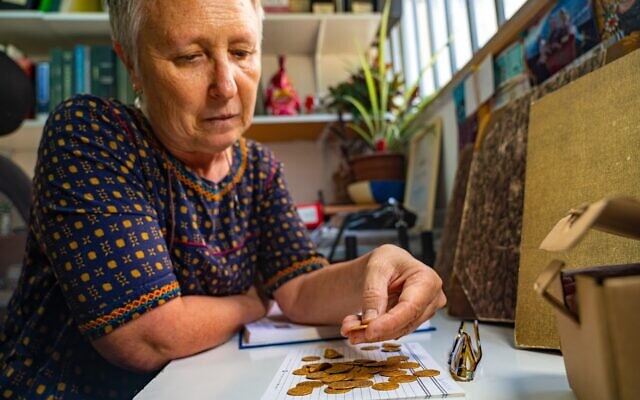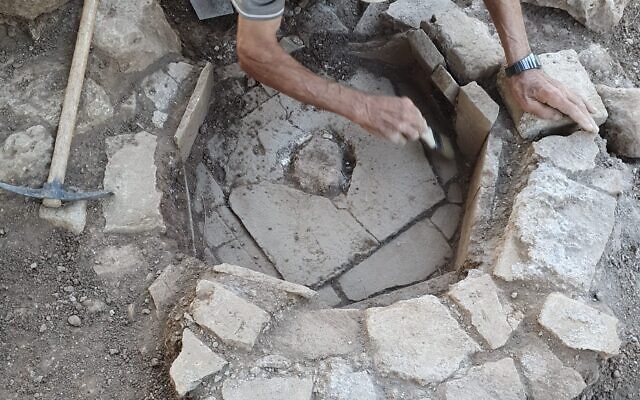Forty-four pure gold coins were recently found hidden in a wall during excavations at the Banias archaeological site within the Hermon River nature reserve in the north of the country, the Israel Antiques Authority said Monday.
The hoard, weighing about 170 grams, was found stashed within the base of an ashlar stone wall.
Archaeologists assessed that the treasure was hidden by its owner during the Muslim Conquest of the area in 635 CE.
“The discovery reflects a specific moment in time, when we can imagine the owner concealing his fortune in the threat of war, hoping to return one day to retrieve his property,” excavation director Yoav Lerer said in a statement. “In retrospect, we know that he was less fortunate.”
“The discovery of the coin hoard may also shed light on the economy of the city of Banias during the last 40 years of Byzantine rule,” Lerer said.
Some of the coins were identified as being minted by Emperor Phocas (602–610 CE) and others by Emperor Heraclius (610–641 CE). The latest of the Heraclius coins were dated to the time of the Muslim Conquest.

Dr. Yoav Lerer, excavation director, with one of the gold coins found in a hoard at the Banias archeological site. (Yaniv Berman/Antiquities Authority)
Israel Antiquities Authority coin expert Gabriela Bijovsky said the Emperor Heraclius coins are of particular interest because they depict a time-lapse record of his family.
“In his early years as emperor, only his portrait was depicted on the coin, whereas after a short time, the images of his sons also appear,” she explained. “One can actually follow his sons growing up – from childhood until their image appears the same size as their father, who is depicted with a long beard.”
IAA Director Eli Escosido said the hoard was of particular importance because “it dates to an important transitional period in the history of the city of Banias and the entire region of the Levant.”

Coin expert Gabriela Bijovsky examines gold coins found at the Banias archaeological site. (Yaniv Berman/Israel Antiquities Authority)
The excavations in the northwestern residential quarter of the ancient city of Banias also uncovered the remains of buildings, water channels and pipes, a pottery kiln, bronze coins, pottery fragments, and glass and metal artifacts, the IAA said. The finds date from the end of the Byzantine period in the early seventh century CE through the early Middle Ages in the 11th–13th centuries.
Evidence of settlement centered around a large spring at the Banias archaeological site stretches back to the Canaanites in 2000 BCE and spans generations through the Hellenistic and Early Roman periods, then Byzantine times, the Crusader period and into the Muslim Conquest.
“The Banias Nature Reserve, endowed with its unique nature and landscape, does not cease to surprise us from a historical-cultural point of view,” Raya Shurky, the director of the National Parks Authority, said.

Exposing a water fountain near to where a hoard of gold coins was found at the Banias archaeological site. (Yoav Lerer/Israel Antiquities Authority)
The excavations were funded by the Israel Electric Corperation, which is carrying out work to connect the ancient Druze holy site of Maqam Nabi Khadr to the national electricity grid.
"pure" - Google News
October 03, 2022 at 03:13PM
https://ift.tt/KJzkaxw
Dozens of pure gold coins discovered in secret cache dating from Muslim conquest - The Times of Israel
"pure" - Google News
https://ift.tt/FkmO4q3
https://ift.tt/5TPzC7H
Bagikan Berita Ini














0 Response to "Dozens of pure gold coins discovered in secret cache dating from Muslim conquest - The Times of Israel"
Post a Comment